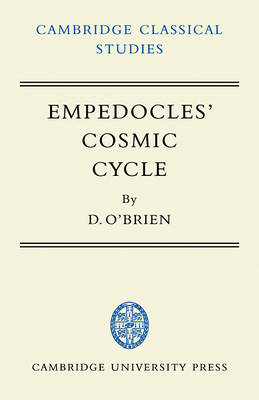
Empedocles' Cosmic Cycle
A Reconstruction from the Fragments and Secondary Sources
Seiten
2009
Cambridge University Press (Verlag)
978-0-521-10037-3 (ISBN)
Cambridge University Press (Verlag)
978-0-521-10037-3 (ISBN)
The cosmic cycle described in the surviving fragments of Empedocles' poem is the alternation, in endless succession, of Love and Strife. Dr O'Brien's book is primarily an analysis of this elaborate system. It seeks to determine the positions which Love and Strife occupy in the world at different times.
The cosmic cycle described in the surviving fragments of Empedocles' poem is the alternation, in endless succession, of Love and Strife. Love is the cause of happiness and unity; Strife the cause of separation and misery. These forces rule in turn as they cause the One and the Many. Love makes the elements into a blissful whole, the Sphere; Strife breaks into the Sphere and causes movement and division - the condition of the world, according to Empedocles, in which we now live. Dr O'Brien's book is primarily an analysis of this elaborate system. It seeks to determine the positions which Love and Strife occupy in the world at different times, the processes involved in becoming one and becoming many and the duration of being one and being many. It examines such associated themes as Empedocles' view of the nature of the soul and his use of the traditional motif 'like to like'. Finally, Dr O'Brien considers Empedocles; place in the subsequent development of Greek philosophy. He sees Empedocles' work as a primitive anticipation of Plato, a significant union of spiritual other-worldliness with the philosophical and scientific traditions of the Presocratics.
The cosmic cycle described in the surviving fragments of Empedocles' poem is the alternation, in endless succession, of Love and Strife. Love is the cause of happiness and unity; Strife the cause of separation and misery. These forces rule in turn as they cause the One and the Many. Love makes the elements into a blissful whole, the Sphere; Strife breaks into the Sphere and causes movement and division - the condition of the world, according to Empedocles, in which we now live. Dr O'Brien's book is primarily an analysis of this elaborate system. It seeks to determine the positions which Love and Strife occupy in the world at different times, the processes involved in becoming one and becoming many and the duration of being one and being many. It examines such associated themes as Empedocles' view of the nature of the soul and his use of the traditional motif 'like to like'. Finally, Dr O'Brien considers Empedocles; place in the subsequent development of Greek philosophy. He sees Empedocles' work as a primitive anticipation of Plato, a significant union of spiritual other-worldliness with the philosophical and scientific traditions of the Presocratics.
Acknowledgement; System of references and abbreviations; 1. The Proposed Reconstruction; 2. Rest and Movement; 3. Speed; 4. Time; 5. The Place of Love and Strife; 6. The Shape of Love and Strife; 7. The Separated Elements; 8. The Cyclic System; 9. The Zoogonical Stages; 10. Conclusion; Notes; Bibliography; Author/date index to the bibliography; Index locorum; General Index.
| Erscheint lt. Verlag | 18.1.2009 |
|---|---|
| Reihe/Serie | Cambridge Classical Studies |
| Zusatzinfo | Worked examples or Exercises |
| Verlagsort | Cambridge |
| Sprache | englisch |
| Maße | 152 x 229 mm |
| Gewicht | 690 g |
| Themenwelt | Geisteswissenschaften ► Philosophie ► Philosophie Altertum / Antike |
| Geisteswissenschaften ► Sprach- / Literaturwissenschaft ► Anglistik / Amerikanistik | |
| Geisteswissenschaften ► Sprach- / Literaturwissenschaft ► Literaturwissenschaft | |
| ISBN-10 | 0-521-10037-2 / 0521100372 |
| ISBN-13 | 978-0-521-10037-3 / 9780521100373 |
| Zustand | Neuware |
| Haben Sie eine Frage zum Produkt? |
Mehr entdecken
aus dem Bereich
aus dem Bereich
mit Sokrates, Seneca, Platon & Co. im Gespräch
Buch | Hardcover (2023)
FinanzBuch Verlag
CHF 25,20


